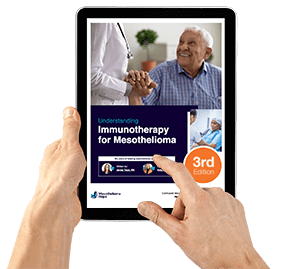While there isn’t a cure for mesothelioma, new and emerging treatment options are helping people live longer with this cancer. However, some patients may not know how to access these treatments or discuss them with their doctors.
If you have been diagnosed with mesothelioma, these 5 tips can help you talk with your doctor about getting the latest treatments.
1. Make Sure Your Doctor Is Experienced With Mesothelioma
Not all doctors have expertise in treating mesothelioma or supporting patients diagnosed with this aggressive cancer. This can result in patients not being able to access critical treatments.
For these reasons, it is important to find a mesothelioma specialist near you. These doctors often have years of experience treating this cancer and will be familiar with the best treatments for your specific case.

“You want to visit somebody that sees a lot of mesothelioma. Just because someone’s a surgeon or oncologist doesn’t mean that they see a lot of mesothelioma, so you want to work with someone that’s a real mesothelioma specialist.”
Get help finding a specialist near you with our Free Doctor Match service.
2. Bring a Friend or Family Member
Family and friends are so important throughout your journey with mesothelioma. Having someone with you during a medical visit — especially if you’re discussing possible treatment options — can help tremendously.
Whether it’s a friend, spouse, or family member, this person can help you communicate your thoughts, ask questions, and advocate for your health.
They might even think of a question or concern about new mesothelioma treatments that you hadn’t yet considered or weren’t comfortable bringing up.

“I tell people don’t let those doctors intimidate you. That is your time. You may start your treatment and all your questions aren’t answered. So be proactive or have somebody there be proactive. They’re just human beings, too. So get their attention.”
3. Gather Information About New Mesothelioma Treatments Beforehand
Many mesothelioma doctors are researching new approaches to treatment, with advancements being made every year.
For example, the immunotherapy drugs nivolumab (Opdivo®), ipilimumab (Yervoy®), and pembrolizumab (Keytruda®) were approved by the U.S. Food & Drug Administration (FDA) in 2020 for various approaches to mesothelioma treatment. Since then, immunotherapy has helped many patients improve their life expectancies.
However, not all doctors may recommend immunotherapy and other new treatments initially. For this reason, it may help to do some research on emerging therapies for mesothelioma.
Some of these emerging therapies include:
- ADI-PEG20 (pegarginimase)
- Cancer vaccines
- Chemotherapy glue
- Cryotherapy
- Epigenetic therapy
- Gene therapy
- HITHOC for pleural mesothelioma
- Photodynamic therapy
- Targeted therapy
- Tumor treating fields (TTFields)
Get the latest information on the leading emerging treatments for mesothelioma in our Free Immunotherapy Guide.
4. Take Notes Before and During Appointments
Even if you already know what you want to ask, it can’t hurt to write down any questions ahead of time.

“I try to encourage patients to keep a pen and paper nearby because sometimes it’s at nighttime or strange hours when they think of questions. Just write them down and bring them with them to their appointments.”
Taking notes will help ensure you don’t forget anything at your appointment and that your doctor addresses all your concerns by the time you leave.
Here are some questions you may want to ask:
- What treatment options are available to me with my type and stage of mesothelioma?
- Would I be a good candidate for immunotherapy?
- Are there any clinical trials that might be a good fit for me?
- What side effects can I expect from my treatment?
- When should I call or raise concerns about side effects?
You (or your advocate) can then take notes on your doctor’s responses to reference later. Our team has also compiled a free list of 14 questions to ask your doctor that can help guide your conversation.
5. Be Patient If Your Doctor Is Cautious
The best mesothelioma treatment options will vary for each person.
For that reason, your doctor might prefer to wait and see about a new treatment, especially if you’re already responding well to an existing therapy.
If this happens, try not to get discouraged. Your doctor may be able to recommend another treatment option that would work better for your specific diagnosis.
You may also consider seeing another doctor for a second opinion to ensure you are getting the best possible treatment.
Get Help Finding the Best Mesothelioma Treatment for You
Talking about new mesothelioma therapies with your doctor might feel overwhelming, but a bit of planning can help you advocate for yourself and potentially open doors to life-changing treatments.
Our team is also ready to help you:
- Find the best treatments and doctors in your area
- Access financial assistance so you can afford treatment and other expenses
- Connect with support groups, peer mentors, and other resources
You deserve personalized support as your family navigates mesothelioma. See how we can help by calling (866) 608-8933 or using our Free Doctor Match.











